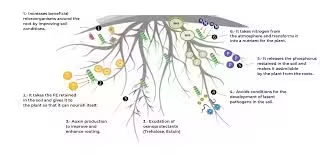Introduction to Soil Amendments
Soil amendments refer to substances added to soil to improve its physical or chemical properties, ultimately enhancing its overall health and productivity. These amendments can take various forms, including organic and inorganic materials, and each type serves a distinct purpose in nurturing the soil ecosystem. The primary goal of incorporating soil amendments is to promote optimal growing conditions for plants by improving soil structure, fertility, and water retention.
The significance of soil amendments cannot be overstated, as they play a crucial role in addressing common soil deficiencies. For instance, sandy soils often exhibit poor water retention and nutrient-holding capacity, while clay soils may suffer from compaction, leading to inadequate drainage. By introducing appropriate amendments, such as organic matter, gardeners and farmers can alleviate these issues, contributing to healthier plant growth.
Organic matter, derived from decomposed plant and animal materials, is particularly vital in soil amendment practices. It increases nutrient availability, enhances microbial activity, and improves soil aeration and structure. The integration of organic amendments not only facilitates better root development but also fosters a resilient ecosystem that supports diverse soil organisms. These microorganisms are essential for nutrient cycling and overall soil health.
Moreover, the implementation of soil amendments can also mitigate environmental concerns. By enhancing soil quality, these practices aid in preventing erosion, increasing carbon sequestration, and promoting sustainable land-use practices. As discussions surrounding soil health continue to evolve, the importance of incorporating organic matter and other amendments into soil management strategies has become increasingly clear, reflecting a commitment to achieving not only enhanced crop yields but also sustainable agricultural practices.
Understanding Organic Matter
Organic matter refers to the remains of once-living organisms, including plants, animals, and microorganisms. This important component of soil plays a crucial role in maintaining soil health and enhancing its overall quality. Various forms of organic matter can be used to improve soil, including composted yard waste, manure, and decomposed leaves. Each of these materials contributes uniquely to the soil’s structure and fertility.
Composted yard waste, derived from organic materials such as grass clippings, leaves, and kitchen scraps, enriches the soil with beneficial nutrients. The composting process transforms these materials into a dark, crumbly substance that retains moisture and improves aeration in the soil. This enhanced aeration is vital for root development and microbial activity, both of which are essential for plant growth.
Manure is another significant form of organic matter. It provides a rich source of essential nutrients, such as nitrogen, phosphorus, and potassium, which are critical for plant health. The application of manure also helps improve soil tilth, which refers to the soil’s physical condition, contributing to better water infiltration and root penetration.
Fallen leaves, often overlooked, also serve as a valuable organic amendment. As leaves break down, they contribute carbon and other vital nutrients to the soil. Additionally, the process of leaf decomposition enhances soil structure, providing a habitat for beneficial microorganisms. These organisms play an essential role in nutrient cycling, further boosting soil fertility.

Incorporating organic matter into soil not only enriches the nutrient profile but also fosters a diverse ecosystem that promotes healthy plant growth. Its capacity to retain moisture and improve soil structure makes organic matter amendments indispensable for effective gardening and agricultural practices.
Benefits of Adding Organic Matter to Sandy Soils
Sandy soils, characterized by their coarse texture and high drainage capacity, often present challenges for gardeners and farmers. One of the most effective strategies to enhance these soils is through the addition of organic matter. Incorporating organic amendments into sandy soils can significantly improve both their water-holding capacity and nutrient retention, ultimately promoting healthier plant growth.
The primary advantage of organic matter addition is its ability to increase the soil’s water retention. Sandy soils tend to drain quickly, which can lead to plants experiencing drought stress. By integrating organic materials such as compost, leaf mold, or well-rotted manure into the soil, gardeners can create a more substantial and cohesive structure that holds moisture better. For instance, a layer of compost worked into the top few inches of sandy soil can enhance its ability to retain water, ensuring that plants have access to moisture during dry spells.
Additionally, organic matter plays a crucial role in nutrient retention. Sandy soils often have low nutrient-holding capacity due to their large particle size, which can make it difficult for plants to absorb necessary elements. When organic matter is added, it acts as a sponge, binding nutrients and preventing them from leaching away with rainfall or irrigation. This is particularly important for nutrients that plants require in significant quantities, such as nitrogen, phosphorus, and potassium. Adding organic materials not only increases the availability of these essential nutrients but also fosters a diverse microbial community that can further aid in nutrient cycling.
For effective amendment of sandy soils, gardeners can adopt several practices. Regularly incorporating organic matter, such as compost or green manures, during soil preparation is beneficial. Cover cropping in the off-season will also introduce organic material back into the soil structure when these crops are turned under. Ultimately, the systematic addition of organic matter can transform sandy soils into more productive growing environments, providing a sustainable approach to gardening and agriculture.
Advantages of Organic Matter for Clay Soils
Clay soils are known for their dense texture and compact nature, which can present numerous challenges for plant growth. One significant advantage of incorporating organic matter amendments into clay soils is the improvement of soil structure. Organic matter, such as compost or well-rotted manure, serves to break up the tightly bound clay particles, leading to enhanced aeration and permeability. This adjustment allows better air circulation and water movement through the soil, which are critical for healthy root development.
Another noteworthy benefit is the capacity of organic matter to retain moisture effectively. While clay soils generally hold water well, they can also become waterlogged, limiting oxygen availability to plant roots. By adding organic amendments, the soil’s moisture-holding ability is improved without increasing the risk of saturation. This dual function helps maintain a balanced moisture regime, providing plants with the necessary water while preventing the perils of root rot resulting from excessive wet conditions.
Furthermore, the application of organic matter can enhance nutrient availability. Organic amendments are rich in essential nutrients that gradually release into the soil as they decompose, thus providing a steady supply of nutrients to plants over time. This slow-release nature of nutrients ensures that plants have access to them during critical growth phases, promoting healthy development and increasing overall yield. Additionally, the presence of organic matter contributes to the populations of beneficial microorganisms in the soil, fostering a more robust ecosystem that supports sustainable plant health.
Incorporating organic matter into clay soils ultimately transforms challenging conditions into a more hospitable environment for plant roots, enhancing their resilience and productivity in the long term.
Nutrient Supply and Soil Microorganisms
Organic matter serves a critical function in enhancing soil health through the continuous supply of essential nutrients, crucial for plant growth. When organic matter is added to the soil, it decomposes over time, gradually releasing nutrients such as nitrogen, phosphorus, and potassium. This slow-release characteristic is particularly advantageous, as it ensures that plants have access to these nutrients over an extended period, reducing the risk of leaching and nutrient runoff. Consequently, the presence of organic amendments not only supports plant development but also contributes to enhanced crop yields and overall agricultural productivity.
Moreover, organic matter acts as a significant food source for beneficial soil microorganisms. These microorganisms, including bacteria, fungi, and protozoa, are vital components of a healthy soil ecosystem. They facilitate various nutrient cycling processes, including the breakdown of organic materials, the conversion of nutrients into plant-available forms, and the formation of soil aggregates, which improve soil structure and water retention capacity. A diverse community of soil microorganisms enhances the soil’s resilience, allowing it to better withstand environmental stresses such as drought or heavy rainfall.
The relationship between organic matter and soil microorganisms is symbiotic; as organic matter decomposes, it nourishes these microbial communities, which, in turn, aid in further organic matter breakdown. This cycle fosters a thriving ecosystem capable of maintaining soil fertility over the long term. It becomes clear that the integration of organic amendments into soil management practices not only provides a steady supply of nutrients but also supports the microbial life that is so crucial to maintaining healthy soils. Recognizing the vital role of organic matter in promoting nutrient supply and fostering beneficial soil organisms can lead to improved soil management strategies and enhanced agricultural sustainability.
Long-Term Benefits of Soil Amendments
The practice of continuously amending soil with organic matter offers numerous long-term benefits that extend beyond immediate improvements in soil quality. One of the most crucial advantages is the significant reduction in the need for chemical fertilizers over time. By enriching the soil with organic amendments, such as compost, manure, or green manures, gardeners can enhance the soil’s nutrient-holding capacity. This improved ability to retain essential nutrients means that nutrients are released slowly, allowing plants to access them more efficiently throughout their growing season.
Moreover, amended soils foster a healthy and diverse soil microbiome, which plays a vital role in nutrient cycling and plant health. Healthy soil organisms, including bacteria, fungi, and earthworms, thrive in environments rich in organic matter, contributing to the breakdown of complex organic materials into simpler forms that plants can readily absorb. This natural process not only reduces dependency on synthetic fertilizers but also improves soil structure, aeration, and water retention, leading to a more resilient garden ecosystem.
In addition to nutrient enhancement, the use of organic amendments promotes better soil aggregation. Well-structured soils can support robust root systems, which are crucial for plants to grow effectively. The ongoing incorporation of organic matter results in soil that can withstand extreme weather conditions, such as droughts or heavy rains. This resilience ultimately leads to increased productivity, as plants are better equipped to thrive in diverse environmental conditions.
Furthermore, maintaining healthy soil through consistent organic matter amendments contributes to sustainable gardening practices. This approach aligns with the principles of regenerative agriculture, as it prioritizes soil health, reduces carbon emissions from synthetic fertilizers, and minimizes environmental impact. Consequently, those who commit to long-term soil amendments not only enhance their gardening yields but also contribute to the broader goals of sustainable land management.

Best Practices for Amending Soil
Amending soil with organic matter is essential for enhancing its health and improving its structure, fertility, and overall ecosystem. Implementing best practices when incorporating organic matter can significantly yield better results. First and foremost, determining the type of soil you have is critical. Different soil types, such as sandy, clay, or loamy, require tailored approaches to amendment. For instance, sandy soils may benefit from amendments that retain moisture, while clay soils often need materials that improve drainage and aeration.
When selecting the right types of organic amendments, one should consider options such as compost, well-rotted manure, leaf mold, and green manures. Compost is a particularly versatile choice, as it enriches the soil with nutrients and improves its texture. Additionally, using diverse organic matter sources can lead to a more balanced nutrient profile. It can be beneficial to obtain these materials from local sources, thereby reducing transport emissions and promoting the local economy.
Incorporating organic amendments into the existing soil should be approached with care. The best method involves tilling or mixing the organic matter into the top six to twelve inches of soil. This process will facilitate microbial activity and nutrient exchange, promoting a healthy soil environment. If dealing with larger plots, it might be useful to employ a rototiller for efficiency; however, hand mixing can be more effective for smaller gardens, allowing for better control over the distribution. Timing is also important; amending soil in the fall or early spring allows for organic matter to decompose and integrate well before planting.
Monitoring soil health after amendments is crucial. Regular soil tests can provide insights into nutrient levels and pH balance. By following these best practices, gardeners and farmers can create a flourishing environment for plant growth and ensure long-term soil sustainability.
Case Study: The Dream Team’s Portland Garden
The Dream Team, a community-focused gardening group, embarked on a project in Portland, which aimed to revitalize a previously neglected urban garden. This case study illustrates their commitment to improving soil health through the strategic use of organic matter amendments. Initially, the garden’s soil was characterized by poor structure, low nutrient levels, and limited microbial activity, which hindered plant growth and productivity.
To address these challenges, the Dream Team implemented a systematic approach to enhance soil health. They conducted a comprehensive soil analysis to identify deficiencies and understand the specific amendments required. The team decided to incorporate several organic materials, including compost, aged manure, and cover crops, as part of their restoration strategy. The organic matter selected was crucial, as it not only enriched the soil with essential nutrients but also improved soil structure and water retention capabilities.
Beginning with the introduction of compost, the team added it to the soil to increase its organic content significantly. This process enhanced microbial diversity, contributing to better nutrient cycling and reduced reliance on chemical fertilizers. In tandem, they employed cover crops during the off-season, which helped prevent erosion, suppress weeds, and further contribute organic matter when tilled back into the soil.
After a growing season, the improvements were notable. The soil exhibited increased fertility and a marked improvement in overall plant vitality. The Dream Team observed healthier plants, increased yield, and an expanded variety of species flourishing in the garden space. This case study not only highlights the potential of organic amendments in transforming soil health but also serves as a testament to the collaborative spirit of community gardening, showcasing how collective efforts can lead to significant ecological and agricultural advancements.
Conclusion
In the realm of gardening and agriculture, the significance of organic matter amendments cannot be overstated. Throughout this post, we have explored how organic amendments enhance soil health by improving its structure, fertility, and overall biological activity. The incorporation of materials such as compost, manure, and other organic resources is vital for enriching the soil, ensuring it can sustain healthy plant growth. Organic matter acts as a reservoir for nutrients, contributes to soil moisture retention, and fosters an environment conducive to beneficial microorganism activity.
Moreover, the application of organic amendments plays a crucial role in addressing the various challenges faced by different soil types. Whether dealing with sandy soils that drain quickly or clay soils that retain excess moisture, organic matter can effectively mitigate these issues, creating a balanced environment that is optimal for plant development. By enhancing aeration and facilitating nutrient exchange, organic amendments support robust root systems, thereby contributing to overall garden success.
Adopting practices that emphasize the use of organic soil amendments is not just beneficial for individual gardens but also aligns with broader sustainability goals. These practices reduce reliance on synthetic fertilizers and promote environmentally friendly gardening efforts. As climate concerns grow, promoting organic matter integration in soil management becomes increasingly vital. By embracing organic amendments, gardeners not only improve their soil health but also cultivate a more sustainable ecosystem. As we move forward, it is imperative for all gardeners—whether novice or experienced—to recognize the transformative power of organic matter in enhancing soil vitality and, ultimately, garden productivity.






Pingback: The Power of Beneficial Microorganisms for Thriving Garden